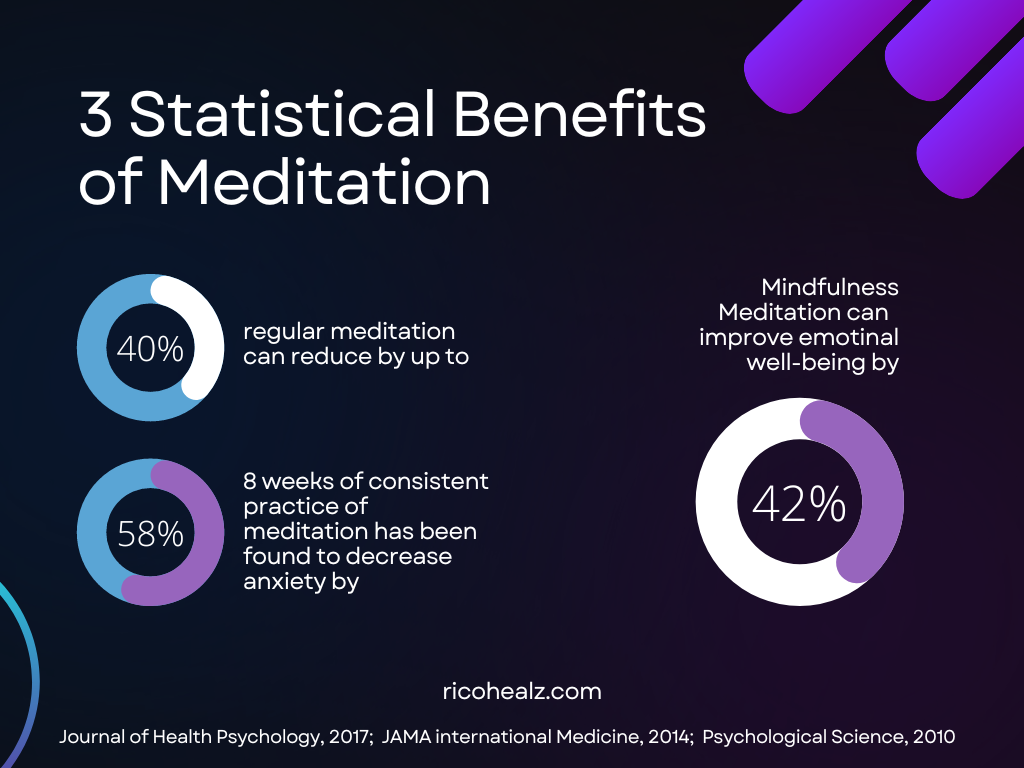Why is Meditation So Powerful? The Science Behind Its Transformative Benefits
Introduction:
Why is meditation so powerful you might ask? Meditation has been practiced for thousands of years, and its popularity has only grown in recent years. The practice of meditation involves training the mind to focus and achieve a state of calm and relaxation. While many people practice meditation for spiritual or religious reasons, there is also a growing body of research that suggests meditation can have significant benefits for physical and mental health.
So, why is meditation so powerful? For starters, meditation can reduce stress levels, which can have a wide range of benefits for overall health. Research has shown that meditation can help lower blood pressure, reduce symptoms of anxiety and depression, and even improve sleep quality. In addition, meditation has been found to improve cognitive function, including memory, attention, and decision-making.
But how does meditation achieve all of these benefits? One theory is that meditation works by changing the brain’s structure and function. Studies have shown that regular meditation can increase the thickness of certain areas of the brain, including the prefrontal cortex, which is responsible for decision-making and self-control. Other research has found that meditation can increase activity in the parasympathetic nervous system, which is responsible for the body’s “rest and digest” response, and decrease activity in the sympathetic nervous system, which is responsible for the body’s “fight or flight” response.

Section 1: The Science Behind Meditation
1.1 The Effects of Meditation on the Brain
Mindfulness meditation is a practice of intentional awareness of the present moment. It has been found to have positive effects on the brain, including strengthening areas responsible for memory, learning, attention, and self-awareness. A study conducted by Harvard researchers found that participants who meditated for just eight weeks had increased gray matter in the hippocampus, which is associated with memory and learning, and decreased gray matter in the amygdala, which is associated with stress and anxiety.
Over time, mindfulness meditation can increase cognition, memory, and attention. It can also help calm down the sympathetic nervous system, which is responsible for the body’s stress response. This can lead to reduced inflammation and decreased risk of conditions such as chronic pain, fatigue, and heart disease.
1.2 The Benefits of Meditation for Mental Health
Studies have shown that consistent meditation can help relieve stress and manage anxiety. It can also reduce inflammation, improve memory and attention, and boost overall well-being. Meditation and mindfulness induce a heightened state of awareness and focused attention, which can lead to increased self-awareness and better handling of disagreements and conflicts.
One study found that participants who practiced mindfulness meditation had reduced symptoms of depression and anxiety compared to those who did not. Another study found that mindfulness meditation was effective in reducing symptoms of post-traumatic stress disorder (PTSD) in veterans.
Overall, the science behind meditation suggests that it can have powerful effects on the brain and mental health. Incorporating a regular meditation practice into your routine may lead to improved well-being and a better quality of life.
Section 2: The Physical Benefits of Meditation
2.1: Reducing Stress and Anxiety
Meditation is known to be an effective way to reduce stress and anxiety. Studies have shown that regular meditation practice can decrease the levels of cortisol, the stress hormone, in the body. The practice of meditation can help individuals to manage their emotions better and develop a more positive outlook on life. Meditation can also help individuals to develop a greater sense of self-awareness, which can help them to identify and manage the sources of their stress and anxiety.
2.2: Improving Sleep Quality
Another physical benefit of meditation is that it can improve sleep quality. Research has shown that regular meditation practice can help individuals to fall asleep faster and stay asleep longer. Meditation can help to calm the mind and reduce the racing thoughts that often keep individuals awake at night. By reducing stress and anxiety, meditation can also help individuals to achieve a deeper and more restful sleep.
2.3: Boosting Immune System
Regular meditation practice has been shown to boost the immune system. Studies have found that meditation can increase the activity of natural killer cells, which are responsible for fighting off viruses and cancer cells. Meditation can also help to reduce inflammation in the body, which has been linked to a range of chronic health conditions. By boosting the immune system, meditation can help individuals to stay healthy and fight off illness.
2.4: Lowering Blood Pressure
Meditation has been shown to be an effective way to lower blood pressure. High blood pressure is a major risk factor for heart disease, stroke, and other chronic health conditions. Studies have found that regular meditation practice can help to lower blood pressure in individuals with hypertension. Meditation can help to reduce stress and anxiety, which can contribute to high blood pressure. By lowering blood pressure, meditation can help individuals to reduce their risk of developing chronic health conditions.

Section 3: The Emotional Benefits of Meditation
3.1: Developing Emotional Intelligence
Meditation has been shown to help individuals develop emotional intelligence. Emotional intelligence is the ability to recognize and understand our own emotions, as well as the emotions of others. Through regular meditation practice, individuals can learn to identify their emotions and regulate them more effectively. This can lead to improved communication, better decision-making, and stronger relationships.
One study found that individuals who practiced meditation had increased activity in the prefrontal cortex, which is associated with emotional regulation and cognitive control. This suggests that meditation can help individuals develop the skills needed to manage their emotions and respond to stressful situations in a more constructive manner.
3.2: Increasing Self-Awareness
Meditation can also help individuals increase their self-awareness. Self-awareness is the ability to recognize one’s own thoughts, feelings, and behaviors. Through mindfulness meditation, individuals can learn to observe their thoughts and emotions without judgment, allowing them to gain a deeper understanding of their own mental processes.
Research has shown that mindfulness meditation can increase activity in the insula, a region of the brain that is involved in self-awareness and empathy. This suggests that meditation can help individuals become more attuned to their own emotions and the emotions of others, leading to greater empathy and compassion.
Meditation can also improve relationships by helping individuals develop greater empathy and compassion. By increasing self-awareness and emotional intelligence, individuals can better understand the perspectives and needs of others, leading to stronger connections and more satisfying relationships.
Research has shown that couples who practice meditation together report greater satisfaction with their relationships and improved communication. Additionally, individuals who practice meditation have been found to have lower levels of stress and anxiety, which can also improve relationships by reducing conflict and tension.

Section 4: The Spiritual Benefits of Meditation
4.1: Connecting with the Universe
One of the most significant spiritual benefits of meditation is the ability to connect with the universe. Meditation helps you tap into your inner self, which is connected to the universal consciousness. By quieting the mind, you can experience a deep sense of oneness with the world around you. This connection can bring a sense of peace and purpose to your life.
4.2: Finding Inner Peace and Happiness
Meditation is known for its ability to reduce stress and anxiety, but it can also help you find inner peace and happiness. Through regular meditation practice, you can learn to let go of negative thoughts and emotions, and focus on the present moment. This can help you cultivate a sense of gratitude and contentment, leading to a more fulfilling life.
4.3: Developing Compassion and Empathy
Another spiritual benefit of meditation is the development of compassion and empathy. When you practice meditation, you learn to observe your thoughts and emotions without judgment. This can help you become more aware of the suffering of others and develop a deeper sense of empathy. By cultivating compassion, you can become more connected to others and the world around you.
In conclusion, the spiritual benefits of meditation are numerous and can have a profound impact on your life. By connecting with the universe, finding inner peace and happiness, and developing compassion and empathy, you can cultivate a deeper sense of purpose and meaning in your life.

